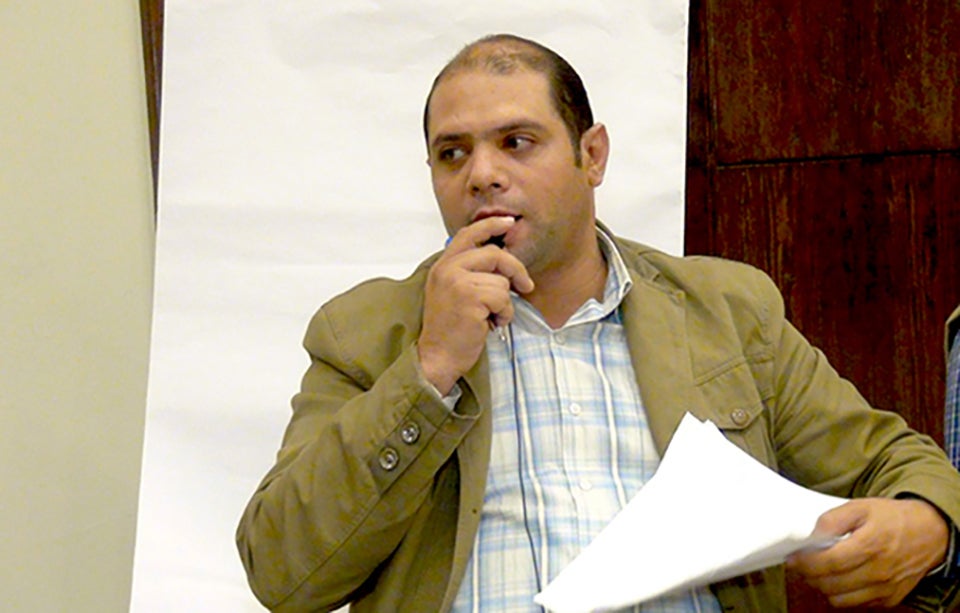Take Five: “During the COVID-19 pandemic, solidarity and cooperation between men and women is crucial… the burden should not all be carried by one partner”
Date:

Amr Mohey El-Din Abdelrahman chairs the Board of Directors of the community-based organization (CBO) Youth Association for Local Community Development, working in Akhmin, Qalyubia governorate. The CBO was one of six CBOs that received small grants under UN Women Egypt’s “Men and Women for Gender Equality (MWGE)” programme, to implement projects in local communities in four governorates (Cairo, Suhag, Assuit, Qalyubia). These focused on combating violence against women, achieving gender equality, fatherhood, co-existence for girls with disabilities and reducing gender discrimination. In partnership with CARE International, a series of trainings were also provided to local CBOs under the programme, in Egypt with generous support from the Swedish International Development Cooperation Agency (SIDA). Through the trainings, Abdelrahman learned about gender equality and enhanced his project management skills.
Before joining the programme, how did you perceive gender equality?
On a personal level, I was a narrow-minded man who believed that women do not need to gain more rights, and I did not feel that I have a role in combating sexual harassment... At home, I used to pressure my wife to do all the house chores without really [helping,] not minding that she had to wake up early, get our kids ready for school, then go to her work.
How has the programme impacted your perception and work towards achieving gender equality?
After the training, I became aware of gender equality, the importance and impact of engaging men to combat violence against women and achieve gender equality and women’s empowerment. I now feel that I can play an active role in society… Women and men, girls and boys should enjoy equal rights, and have equal access to resources and opportunities. We hired more women in our CBO after realizing the great impact they could have. We started raising awareness about sexual harassment in Akhmeen and Shalqan villages in Qalyubia governorate. We provided trainings and awareness-raising activities that targeted tuk tuk [three-wheeled taxi] drivers to educate them about the negative impact of sexual harassment on women and the community as a whole. Moreover, tuk tuk drivers and community members participated in psychodrama activities highlighting the importance of combatting sexual harassment and enhancing gender equality through art and theatrical performances in public spaces.
How did the trainings provided by your CBO help change the community’s perceptions towards women?
Through trainings and awareness-raising activities provided by our CBO, we managed to turn 100 tuk tuk drivers into gender equality advocates and leaders of change, working with us on educating the rest of the community by disseminating “Because I am a man” [campaign] messages against violence against women and sexual harassment. The programme has succeeded in reaching around 350 tuk tuk drivers and changing the gender-related misperceptions they had by encouraging them to take part in combating sexual harassment and advocating for women’s rights and gender equality.
In light of the pandemic, how has the crisis and stay-at-home orders affected you and your community?
Although we are threatened by the risk of infection by coronavirus and are worried about our families and children, I believe there is a positive side to the stay-at-home orders and quarantine. For me, personally, I started sharing household chores with my wife, who works in a pharmaceutical and vaccine company, and decided to continue working to help society during this tough period. I now have enough time to talk to my kids and listen to them. Unfortunately, domestic violence against women has increased in the community, due to the economic challenges that a lot of workers are facing.
What actions were taken by the CBO in response to COVID-19?
After the announcement of curfews in March 2020 and the suspension of on-the-ground activities, our CBO convened a meeting to plan with UN Women and CARE International how to mitigate the consequences of the crisis. Our CBO approached local partners to provide food supplies to around 150 families in need. UN Women provided us with infographics and publications developed by the World Health Organization to raise the community’s awareness on how to protect themselves from coronavirus. In partnership with UN Women, sanitizers, masks and gloves will soon be delivered to around 100 families. Last but not least, during the COVID-19 pandemic, solidarity and cooperation between women and men is crucial… the burden should not all be carried by one partner. Now is the time to share responsibilities and redefine perceptions.
Read Arabic